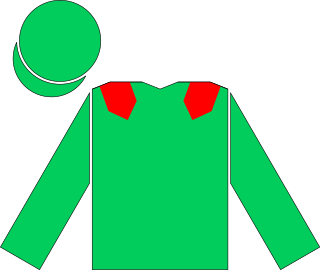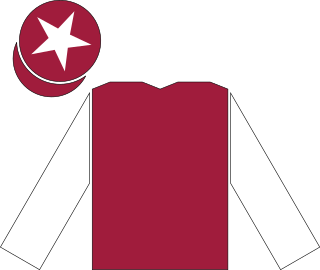Related Research Articles

Lyphard was an American-bred, French-trained Thoroughbred racehorse and an important sire.

Troy was an Irish-bred, British-trained Thoroughbred racehorse and sire. In a career that lasted from 1978 to 1979, he ran eleven times and won eight races. He is most notable for his form in the summer of 1979, when he won the 200th running of the Derby and subsequently added victories in the Irish Derby, the King George VI and Queen Elizabeth Stakes and the Benson and Hedges Gold Cup. He was retired to stud at the end of the season. His career as a stallion lasted only four years before he died in 1983.

Zarkava is an undefeated French Thoroughbred racehorse who won the 2008 Prix de l'Arc de Triomphe.
Northern Trick was an American-bred, French-trained Thoroughbred racehorse and broodmare. In a racing career which lasted from April to October 1984 she won four of her six races. She established herself as the best three-year-old filly in Europe by winning the Prix de Diane and the Prix Vermeille before finishing second in the Prix de l'Arc de Triomphe. She was then retired to stud and had some success as a broodmare.

Interpidity was a British-bred, French-trained Thoroughbred racehorse. In a racing career which lasted from April 1993 to November 1994 the filly ran twelve times and won four races. Unraced as a two-year-old, Intrepidity proved to be the outstanding three-year-old filly in Europe in 1993, winning the Prix Saint-Alary and the Prix Vermeille in France and The Oaks in England. She also finished fourth in the Prix de l'Arc de Triomphe, beaten one and a half lengths. At the end of the year she was voted European Champion Three-year-old Filly at the Cartier Racing Awards. Intrepidity was kept in training as a four-year-old, but failed to win, although she finished second in the Prix Ganay and the Prix Foy. She was then retired to stud where her record as a broodmare was disappointing.
Akiyda was a British-bred, French-trained Thoroughbred racehorse and broodmare best known for winning France's mot prestigious race, the Prix de l'Arc de Triomphe in 1982. After winning her only race as a two-year-old she was campaigned in the highest class in the following year, finishing second in both the Prix de Diane and the Prix Vermeille before beating a strong international field in the Prix de l'Arc de Triomphe. Akiyda never ran after her win in the Arc: she was retired to stud where she had limited impact as a broodmare.
Harbour (1979–1985) was a French Thoroughbred racehorse. In the early part of 1982 she appeared to establish herself as the best of an exceptionally strong group of French three-year-old fillies by winning the Prix Vanteaux, Prix Saint-Alary and Prix de Diane and decisively defeating rivals including All Along and Akiyda. Her form was less impressive in the autumn and was retired after a disappointing run in the Prix de l'Arc de Triomphe.
Detroit was a French Thoroughbred racehorse and broodmare who won the Prix de l'Arc de Triomphe in 1980. Unraced as a two-year-old, Detroit won her first four races in 1980 including the Prix Fille de l'Air, Prix Chloé and Prix de la Nonette. She was beaten when favourite for the Prix Vermeille before winning the Arc in record time. She remained in training as a four-year-old and won three more races including the Prix Foy. She was retired to stud where she produced the Arc de Triomphe winner Carnegie.
Al Nasr was a French Thoroughbred racehorse and sire. He was one of the leading horses of his generation in France, winning the Prix La Force and Prix de la Côte Normande as three-year-old in 1981 before reaching his peak as a four-year-old when he won the Prix Exbury, Prix Dollar and Prix d'Ispahan. He failed to reproduce his best form when competing abroad, running poorly in The Derby and the Arlington Million. He was retired to stud in 1983 and had some success as a sire of winners. Al Nasr was the first major flat race winner trained by André Fabre.

The 1983 Prix de l'Arc de Triomphe was a horse race held at Longchamp on Sunday 2 October 1983. It was the 62nd running of the Prix de l'Arc de Triomphe.
The 1979 Prix de l'Arc de Triomphe was a horse race held at Longchamp on Sunday 7 October 1979. It was the 58th running of the Prix de l'Arc de Triomphe.
Top Ville was an Irish-bred, French-trained Thoroughbred racehorse and sire. In the autumn of 1978, the colt established himself as one of the leading two-year-old colts in France with wins in the Prix Saint-Roman, Prix de Condé. In the following year, he took his winning run to six with victories in the Prix de Guiche, Prix Lupin and Prix du Jockey Club, beating top-class opponents including Irish River and Le Marmot. He was beaten in his two remaining races and was retired to stud, where he became a successful and influential breeding stallion.
Le Marmot was a French Thoroughbred racehorse and sire. He won two of his three race as a two-year-old in 1978 including the Prix La Rochette before emerging as a top-class performer in the following year when he won the Prix Greffulhe, Prix Hocquart and Prix Niel as well as finishing second in the Prix du Jockey Club and the Prix de l'Arc de Triomphe and third in the Washington, D.C. International. As a four-year-old he defeated the Arc de Triomphe winner Three Troikas in the Prix Ganay and also won the Prix Niel. Le Marmot was rated one of the ten best racehorses in Europe in both 1979 and 1980. He had little opportunity to prove himself as a sire of winners, dying in 1981 at the age of five.

Northern Baby was a Canadian-bred, French-trained Thoroughbred racehorse and sire. In a racing career which lasted from October 1978 until September 1980 he won five of his seventeen races. After showing promising form as a two-year-old he emerged as a top-class middle-distance performer in 1979, winning the Prix de la Côte Normande in France but showing his best form in England, where he finished third in both The Derby and the Eclipse Stakes before recording his most important victory in the Champion Stakes. He remained in training as a four-year-old with mixed success, running several moderate races but defeating the outstanding filly Three Troikas in the Prix Dollar. He was retired to stud and became a very successful sire of steeplechasers. He died in 2007 at the advanced age of thirty-one.
Sigy was a French Thoroughbred racehorse and broodmare. She was best known for her exploits as a two-year-old in 1978, when she won her last three races culminating with a win over colts and older horses in the Prix de l'Abbaye. At the end of the season she was rated the best racehorse of her age and sex in Europe. Her three-year-old career was disappointing, although she did win the Prix du Gros Chêne. She later had some success as a broodmare.
Dancing Maid was a French Thoroughbred racehorse and broodmare. After winning one of her two races as a two-year-old she emerged as one of the best fillies in Europe in 1978, winning the Prix Vanteaux, Poule d'Essai des Pouliches, Prix Chloé and Prix Vermeille. She also finished a close second in the classic Epsom Oaks and third in Europe's most prestigious all-aged race, the Prix de l'Arc de Triomphe. She was retired from racing after one unsuccessful start as a four-year-old. She was not a success as a broodmare.
Riverqueen was a French Thoroughbred racehorse and broodmare. After winning her only race as a two-year-old she emerged as one of the best fillies in Europe in the spring and summer of 1976, winning the Prix de la Grotte, Poule d'Essai des Pouliches and Prix Saint-Alary. After her winning run was brought to an end by Pawneese in the Prix de Diane she rebounded to become the first three-year-old filly to win the weight-for-age Grand Prix de Saint-Cloud. After running poorly in her last two races she was retired from racing and had some success as a broodmare. Her last recorded foal was born in 1989.
Comtesse de Loir was a French Thoroughbred racehorse and broodmare. In her three-year racing career, she won only one important race, the Prix Saint-Alary in 1974. but was placed in numerous major events including the Critérium des Pouliches, Prix de Diane, Prix Vermeille, Prix de l'Arc de Triomphe (twice), Prix Ganay, Canadian International Stakes and Washington, D.C. International. Her performance in the 1973 Arc, when she was beaten a head by Allez France, saw her rated the best three-year-old of either sex to race in Europe that year.
Reine de Saba was a French Thoroughbred racehorse and broodmare. Bred and owned by Jacques Wertheimer and trained by Alec Head she raced for three seasons and won five of her twelve races. After showing promise as a juvenile, she emerged as one of the leading three-year-old fillies in Europe in the spring and early summer of 1978, winning all three of her races including the Prix Saint-Alary and the Prix de Diane. Her season was ended by injury in June and when she returned as a four-year-old she was less effective, winning only one of her six races. As a broodmare she produced two foals that raced and were both good winners.
Dunette was a French Thoroughbred racehorse and broodmare. In three seasons of racing she won five of her thirteen races and twice defeated the outstanding racemare Three Troikas. As a two-year-old she showed considerable promise by winning two of her three races including the Prix d'Aumale. In the following year she was beaten by Three Troikas in her first two races before springing a 50/1 upset over her great rival in the Prix de Diane. As a four-year-old she dead-heated for first place in the Grand Prix de Saint-Cloud and successfully conceded weight to Three Troikas in the Prix du Prince d'Orange. She was rated the second-best filly of her generation in Europe in both 1979 and 1980. After her retirement from racing she had some success as a broodmare, producing the Canadian International Stakes winner French Glory.
References
- ↑ "John Kramer".
- 1 2 3 4 5 6 7 8 Arthur Fitzgerald (1997). The Arc – The Grand History of the Prix de l'Arc de Triomphe. Genesis Publications Limited. ISBN 0-904351-59-9.
- ↑ Timeform staff (1980). Racehorses of 1979. Timeform. ISBN 0-900599-29-4.
- ↑ Timeform staff (1981). Racehorses of 1980. Timeform. ISBN 0-900599-31-6.